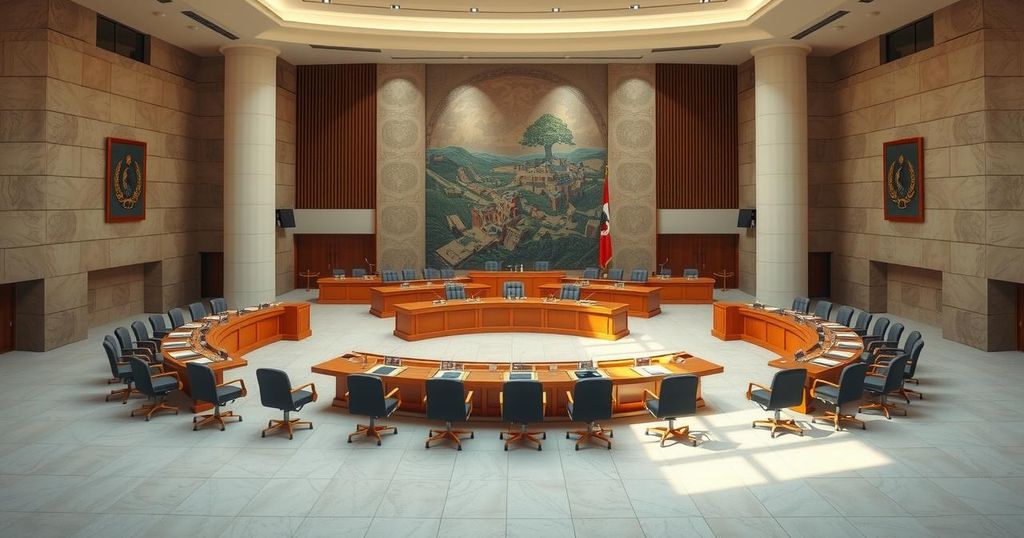Russia seeks to solidify its military foothold in Syria by negotiating new agreements with the incoming rebel leadership, enhancing economic ties and maintaining its strategic military bases. This shift occurs as U.S. allies hesitate in their support, providing Russia with unexpected leverage and potential for renewed partnerships. Recent financial assistance and discussions on various projects illustrate Russia’s commitment to regaining influence in the region.
In the latest developments regarding Syria, Russia appears to be pursuing an agreement to maintain its military presence, despite the shift in power dynamics with Syrian rebels. Moscow, having played a significant role in supporting President Bashar al-Assad during the civil war, now sees an opportunity to bolster its influence as the rebel group, Hayat Tahrir al-Sham, gains prominence. This change comes amid hesitations from U.S. allies in the Middle East regarding engagement with the new government, presenting a favorable environment for Russia.
Recently, Russia made strides in its relations with Syria by providing an equivalent of $23 million in Syrian currency to Damascus’s central bank. This financial assistance, which many other nations avoided due to sanctions, indicates Russia’s flexibility in engaging with Syria’s economy. Simultaneously, regional players like Qatar and Saudi Arabia are delaying their financial support, awaiting clarity from the U.S. on potential sanctions affecting the new Syrian leadership.
Although Moscow faces its own sanctions from the U.S. and Europe due to the ongoing war in Ukraine, it remains undeterred in forming alliances with Syria. Analysts suggest that Russia capitalizes on its lack of ethical constraints, allowing for direct negotiations free from external consensus. As Anna Borshchevskaya emphasizes, the real issue lies in how Western nations choose to engage with Syria, which could dictate the extent of Russia’s influence.
Russia’s aspirations center on retaining its military bases in Syria, which bolster its geopolitical reach amidst setbacks elsewhere. Ongoing discussions encompass a range of issues, including financial investments, gas field management, and potential apologies for past bombing campaigns. Although the Russian side denied requests related to the extradition of Assad, further dialogue continues to unfold.
In stark contrast, the U.S. remains uncertain and has not formed a coherent strategy, as highlighted by former diplomat David Schenker. The absence of a robust U.S. response enhances Russia’s position, making it easier for Moscow to reestablish its footing in the region. A successful agreement could strengthen the previously solid connections between Russia and Syria, reviving significant trade relationships that benefited both nations during the Assad era.
Negotiations initiated by Russian officials in January aimed primarily at Russia’s air base and naval facility in Syria, but have subsequently diversified to include economic collaboration. The relationship has gained pace following a recent phone call between Putin and Syria’s new president, Ahmed al-Sharaa, leading to discussions about improving the socio-economic condition in Syria.
Syria seeks to expand its alliance options beyond Turkey, which had previously supported the rebel factions. However, the Syrian government appears to approach discussions with Russia cautiously, framing their requests as demands for reparations for past damages caused during Russian military interventions. This includes potential repatriation of funds previously sent to Russia and involves scrutiny of financial dealings by the Assad family.
Following recent diplomatic interactions, Putin extended an invitation to Syria’s foreign minister, signifying an openness to renegotiate previous agreements. These would cover various critical infrastructure projects, including those related to natural gas and phosphate mining, linking Russia’s interests closely with Syria’s economic recovery efforts.
Historically, Assad’s partnership had yielded mixed results for Moscow, with the late efforts to strengthen Syria’s ties to Russia facing setbacks due to external pressures. Nevertheless, Russia’s influence in Syria remains significant, aligning with the nation’s broader strategic objectives to counter Turkish and Iranian dominance in the region.
While past Russian actions have drawn condemnation, there is a current push for reconciliation as Syrian officials express a desire to foster a new relationship. Russia’s potential resurgence in Syria could reshape the balance of power significantly in the volatile Middle Eastern landscape.
In summary, Russia is diligently pursuing a strategy to maintain and enhance its military presence in Syria amidst the changing political landscape. With financial support already extended to the Syrian central bank, Russia aims to capitalize on the uncertainty faced by U.S. allies regarding engagement with the new Syrian regime. The evolving dynamics suggest a renewed partnership, potentially revitalizing historic ties while expanding Russia’s geopolitical influence in the region. Should these negotiations prove successful, both nations may navigate new opportunities to counterbalance the influences of Turkey and Iran.
Original Source: www.livemint.com




